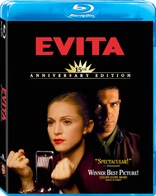Evita Blu-ray Movie
HomeEvita Blu-ray Movie 
15th Anniversary EditionDisney / Buena Vista | 1996 | 135 min | Rated PG | Jun 19, 2012
Movie rating
7.2 | / 10 |
Blu-ray rating
| Users | 4.6 | |
| Reviewer | 4.0 | |
| Overall | 4.3 |
Overview
Evita (1996)
Film adaptation of Tim Rice's and Andrew Lloyd Webber's smash stage musical detailing the life and death of Argentina's controversial First Lady.
Starring: Madonna, Antonio Banderas, Jonathan Pryce, Jimmy Nail, Peter PolycarpouDirector: Alan Parker (I)
| Musical | Uncertain |
| Biography | Uncertain |
| Drama | Uncertain |
Specifications
Video
Video codec: MPEG-4 AVC
Video resolution: 1080p
Aspect ratio: 2.40:1
Original aspect ratio: 2.39:1
Audio
English: DTS-HD Master Audio 5.1 (48kHz, 24-bit)
Subtitles
English SDH, Spanish
Discs
50GB Blu-ray Disc
Single disc (1 BD)
Playback
Region free
Review
Rating summary
| Movie | 4.5 | |
| Video | 4.5 | |
| Audio | 4.5 | |
| Extras | 2.0 | |
| Overall | 4.0 |
Evita Blu-ray Movie Review
"She Didn't Say Much, But She Said It Loud"
Reviewed by Michael Reuben June 21, 2012Evita's stature has grown with the passage of time, and even if you feel (as many fans do) that Alan Parker's 1996 film adaptation doesn't capture the electricity of the stage musical at its best, the movie remains one of the most effective stage-to-screen adaptations of the last thirty years. Both lyricist Tim Rice and composer Andrew Lloyd Webber have had hugely successful careers, together and apart, and each one is probably better known for works more popular even than Evita (Lloyd Webber for The Phantom of the Opera and—God help us!—Cats, and Rice for The Lion King), but I suspect Evita will remain crucial to their artistic legacies. It seemed a strange premise for a musical when the show debuted in 1978 (after release of a "concept album" in 1976). It must have seemed stranger still when Rice first suggested it to Lloyd Webber. For all the attention she garnered during her short life, many would dispute whether Eva Perón actually accomplished anything. Thousands may have cheered as she stood on the balcony of the Casa Rosada following the election of her husband as president of Argentina, and thousands more followed her coffin to its final resting place when she died a few years later at age 33, but given the troubled history of coups and juntas that followed, it's hard to see her as more than a blip on the radar charting the country's erratic course through the 20th Century. Hers was merely "the death of an actress", says the story's narrator, Ché, dismissively. But Ché doesn't get the final word in Evita, even if he is the story's narrator. One reason for Evita's longevity (aside from the memorable score) is the dramatic energy it generates from the fiery clash of its dramatic leads: Juan Perón the realist, Ché the idealist, and Eva the star, who threatens to overpower them both. In common with all the best dramas, no point of view emerges victorious, but they all have their say. Rice and Lloyd Webber managed to stick closely enough to Eva Perón's biography (though, as with many controversial figures, the facts are in dispute) that, for a long time, Evita seemed to be primarily a historical drama. Over time, however, it has revealed itself as a prescient parable about celebrity in the modern world, especially as celebrity and politics have become almost indistinguishable. The Eva Perón of Evita yearns for power, but she has no interest in actually doing anything with it. That gives her a huge advantage over those, like her husband, still interested in pursuing the "art of the possible", who are quickly upstaged by a woman with a talent for entertainment and, more importantly, a bottomless appetite for the crowd's adulation. Today such people are legion, and they occupy all points on the political spectrum. Evita was their vanguard.
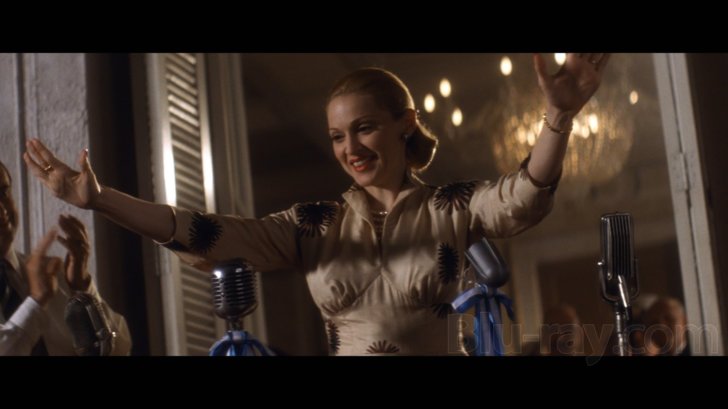
Parker's script (the credit to Oliver Stone was a formality) generally sticks to the plot of the stage musical, a choice dictated by the structure of the songs and their lyrics. The chief innovation of the screenplay is to take the stage-bound tableaus ingeniously created by Hal Prince for the London and Broadway productions and re-imagine them for realistic locations, often with thousands of extras. Because Evita is a "sung-through" musical, with almost no spoken dialogue, Parker didn't have to be concerned with transitions between speech and song (an issue he'd previously grappled with in Fame). Indeed, the narrative style harkens back to his dramatization of Pink Floyd The Wall (1982). The film opens with the death of Eva (Madonna) on July 26, 1952, and the massive outpouring of national grief, on which Ché (Antonio Banderas) comments with unrelenting cynicism ("Oh What a Circus"). The film then winds back twenty-six years to answer Ché's ironic question: "What kind of goddess has lived among us?" On screen as on stage, the best parts of the film chronicle Eva's rise from poverty and obscurity to First Lady. The bastard daughter of a respectable man's mistress, Eva seizes the first opportunity to launch herself at the Big City like a guided missile. The city may be called "Buenos Aires", but Rice's lyrics appropriately refer to it as "Big Apple", because for Eva its theme song may as well be "New York, New York". If she can make it there, she can make it anywhere. Her ticket out of the boondocks is a small-time singer named Magaldi (Jimmy Nail), who reluctantly brings her back with him from an out-of-town engagement ("Eva Beware of the City"), only to abandon her outside the apartment he shares with his wife and family. Neither surprised nor deterred, Eva sleeps her way through the powerful and connected of Buenos Aires in a swirl of intrigue that mirrors the murky condition of the Argentine state ("Goodnight and Thank You"). When she meets Perón (Jonathan Pryce), she senses an opportunity and seizes it ("I'd Be Surprisingly Good for You"). The disapproval of his fellow officers and of high society doesn't slow her down ("Perón's Latest Flame"), nor does she waver when even Perón himself has doubts and suggests they leave for the safety of a quiet life in exile. Eva has not struggled and suffered just to settle for comfortable obscurity, and she rallies the common people of Argentina in support of Perón, stressing that she is one of them ("A New Argentina"). When Perón is swept into power, the crowds chanting outside the Casa Rosada cry out not only for him, but for the new First Lady in whom they see themselves ("Don't Cry for Me Argentina"). Achieving success is always more exciting than enjoying it, and the last third of Evita struggles to maintain the furious energy of the Peróns' rise to power. Still trying to remain one of the people, Eva transforms herself into a glamor queen; she make herself into a celebrity idealization of the common folk ("High Flying, Adored"; "Rainbow High"). She undertakes a world tour on behalf of the country, with mixed results ("Rainbow Tour"). And she establishes a charitable foundation that becomes notorious for its loose spending and lack of bookkeeping ("And the Money Kept Rolling In (and Out)"). All of this comes to a crashing halt when Eva is stricken with cancer (the illness isn't specified in the film). Unfortunately, her illness also drains the vitality from the story, and neither Prince's direction on stage nor Parker's on film fully compensated for this inherent defect in the material. A striver who's lost the strength to strive ceases to be interesting, unless in so doing she's granted some sort of insight, and nothing in Eva's life suggests the kind of depth of character that would support such a transformation. Indeed, the new song that Rice and Lloyd Webber wrote for this portion of the film aptly sums up the main impulse that animated all of Eva's efforts: "You Must Love Me". (The song was the film's only Oscar win.) Madonna was a much bigger star when she made Evita than she is now, and her casting in the lead role was sufficiently controversial that it was almost a distraction. After almost ten years of largely unsuccessful attempts at a film career, the announcement that she'd been handed such a plumb part engendered audible groaning. As it turned out, the role of Eva was ideally suited to Madonna's limited range as an actress, within which she has always been devastatingly effective. A creature of music videos, she had mastered the art of using costume, gesture and general demeanor to convey a message simply and directly. (If you were a teenager or older in 1983 when her debut album was released, you know what I mean.) It was spoken dialogue that always got her into trouble, and Evita dispensed with that requirement. Besides, as Madonna said in interviews, she and Eva had a lot in common, starting with their boundless determination to succeed. She might have added: "and be the center of attention". The last thing anyone wants for a character like Evita is an actress who disappears into the part. Antonio Banderas, whose rapid progress in learning English had sped him from supporting parts in Philadelphia and Interview with the Vampire to main roles in Assassins and Desperado, provides an effective counterweight with his cynical Ché. Parker wisely cast the role with an actor whose matinee idol looks could stand up against Evita's glamor, so that the visual battle between idealism and self-aggrandizement would be more evenly matched. Faced with these two dynamos, Jonathon Pryce wisely underplays Juan, retreating behind the elaborate makeup and making Perón into an observer who watches everything around him. While Ché and Eva exhaust themselves with the crowd—he in it, she reaching out to it—it's Perón who understands how to use it.
Evita Blu-ray Movie, Video Quality 
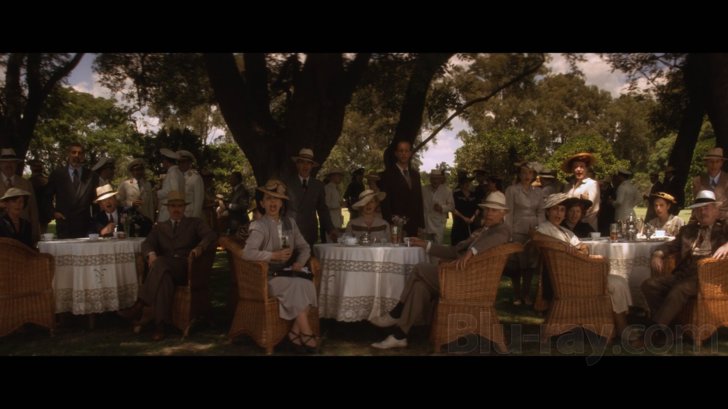
Darius Khondji, the poet of dark spaces who shot David Fincher's Se7en, was the cinematographer on Evita, much of which was shot on location in Buenos Aires and Budapest (where the architecture resembles Buenos Aires of the 1930s). Khondji's palette for Evita is a rich selection of warm earth tones: browns, greens, ochres, rusts. Blues and other cool tones rarely occur except as an accent. The photography effectively evokes both the outer heat of the climate and the emotional heat of the passionate characters. Disney's 1080p, AVC-encoded Blu-ray presents an exceptionally film-like image, which remains finely detailed throughout, though it tends to be softer than eyes accustomed to contemporary digital photography might expect. The extent of detail is most readily observed in the many long shots featuring large groups of people: rallies, military barracks, fancy dining rooms of the upper class. Individual faces are readily distinguishable, as are details of clothing and decor. The image may not "pop", nor should it, since Evita was made before the era when digital intermediates became a standard tool for making film look more like video. Evita looks like film, complete with a light but discernible grain pattern that appears undisturbed by inappropriate filtering or noise reduction. Nor has there been any artificial sharpening applied, though someone might have been tempted to do so, given the softness of the image. Thankfully, any such temptation was resisted. Khondji is known for his blacks, and at least on my monitor, which is properly calibrated, the blacks appeared truly black. Khondji also used different levels of black (and shades of gray) to represent the night in Buenos Aires, when the lights of the city prevent darkness from closing in entirely. Colors are rich and saturated, but rarely are they bright (there's that lack of "pop" again). I have not seen Evita look this good since I first viewed it in the theater. (Note: I have seen claims that the early portion of the film suffers from "DNR". This is just one more example of how the term "DNR" has become internet-speak for "I don't like the picture". I saw absolutely no indication of any noise reduction applied to Evita, or at least none that reduced picture information or "smeared" the image, and I certainly observed no change in image quality midway through the film that was attributable to anything other than the evolution of the story and/or changes in filming technique.)
Evita Blu-ray Movie, Audio Quality 
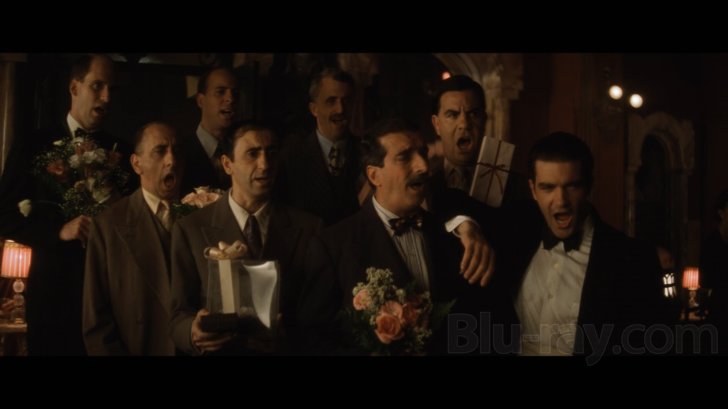
Evita was released in Dolby Digital 5.1, as was the Criterion laserdisc and the Disney DVD. The Blu-ray's DTS-HD MA 5.1 track presumably shares the same source. Lloyd Webber's music dominates the track, as it should, because it's the sonic "through line" of the film. The orchestra has a rich, full presence that makes good use of the discrete format to provide a sense of depth and to envelop the viewer in the experience. Having heard the PCM 2.0 soundtrack CD many times, I appreciated the additional spaciousness and sense of separation supplied by the 5.1 format. If the soundtrack were being recorded today, it would no doubt benefit from advanced digital recording and mixing techniques, but what's here is quite impressive. (Contrary to the experience reported by some posters, my subwoofer engaged regularly. The orchestra's bass extension doesn't match that of action movie sound effects, but it's appropriately deep for an orchestra.) The vocal recordings from the studio sessions are well-mixed so that they feel part of the action on screen and don't have the vaguely detached quality that one often finds in older movie musicals. Solo voices remain centered, while choruses are spread across the front soundstage. The lyrics are generally intelligible, except for an occasional turn of Banderas' accent or a group intonation that slurs a word, but the subtitles are always available. Sound effects are relegated to a secondary role, and none of them are routed to the rear channels. To do so would be to distract from the music.
Evita Blu-ray Movie, Special Features and Extras 
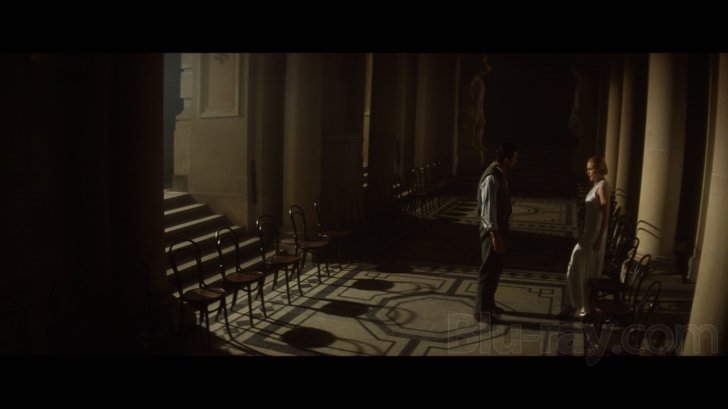
Disney's 1998 DVD release of Evita was featureless. A deluxe laserdisc edition from Criterion in 1997 contained all of the features below and considerably more: a trailer (in addition to the "teaser trailer" listed below); 5 TV spots; the illustrated shooting script; a 1947 Time Magazine article about the Peróns illustrated with archival footage; a 1948 New Yorker article illustrated with archival photographs; and a feature-length commentary by director Parker.
- The Making of Evita (SD; 1.66:1, non-enhanced; 42:13): An excellent documentary that catches director Parker and his stars, as well as Lloyd Webber, in the recording studio and on location in Argentina and Hungary. The on-set footage is illuminating, and the interviews are entertaining.
- Music Video: "You Must Love Me" (SD; 2.35:1, non-enhanced; 3:16): It is axiomatic that every movie musical must have a newly written song that can qualify for Oscar consideration, but this one happens to be very good and consistent with the overall tone of Evita. The video has the virtue of being simply conceived and shot.
- Teaser Trailer (SD; 1.78:1, non-enhanced; 1:54): It's fine as far as it goes, but why not also include the full trailer?
- Sneak Peaks: The Odd Life of Timothy Green, Castle, ABC on DVD and Blu-ray, anti-smoking PSA.
Evita Blu-ray Movie, Overall Score and Recommendation 
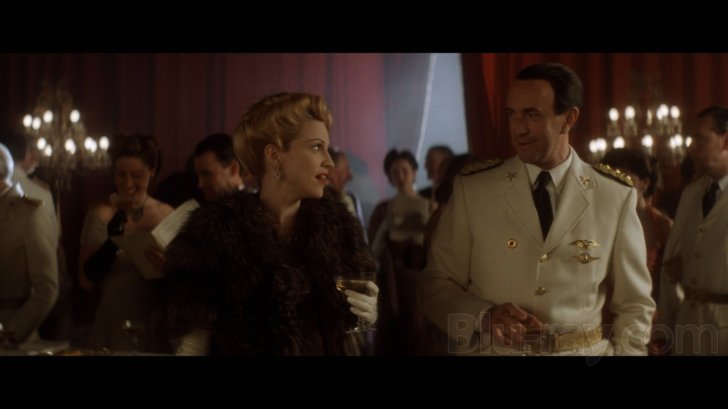
Evita reveals something new every time I watch it. On this viewing I was struck by the degree to which Eva's early death transforms her love affair with fame into a Romeo and Juliet story. Over the long haul, fame is a fickle lover, as any of a hundred bio-pics can attest, with their almost ritualized second acts of troubled relationships and substance abuse, when fame turns out to be an emotional sponge, all take and no give. And Eva never had to confront issues of aging and passing the torch; she never had to live that "All About Eve" moment when someone says to her (as she said to Perón's prior mistress): "Hello and goodbye. I've just unemployed you." A short life and a tragic death froze her in fame's embrace, much as we see her in the imaginary waltz with Ché, or even in her last appearance on the Casa Rosada balcony: frail but still beautiful, still offering hope (however illusory) to her descamisados, still functioning as the vessel of impossible dreams. Far from being a tragedy, death completed her achievement and cemented her legacy. Parker's film allows this ironic underside of Evita's story to emerge far better than any stage production I've seen to date, and the Blu-ray capably presents it. Highly recommended.
Similar titles
Similar titles you might also like

Carmen Jones
Fox Studio Classics
1954

Dreamgirls
2-Disc Showstopper Edition
2006

Hamilton
2020

Jersey Boys
2014

Fame
1980

The Great Ziegfeld
Warner Archive Collection
1936

How to Succeed in Business Without Really Trying
1967

Carousel
1956

Jesus Christ Superstar
1973

The Unsinkable Molly Brown
Warner Archive Collection
1964

Gypsy
Warner Archive Collection
1962

Show Boat
1936

De-Lovely
Special Edition
2004

Burlesque
2010

A Chorus Line
1985

Hair
1979

Victor/Victoria: The Broadway Musical
1995

Words and Music
Warner Archive Collection
1948

Anchors Aweigh
1945

Godspell
1973
